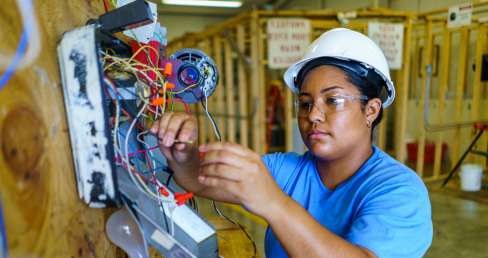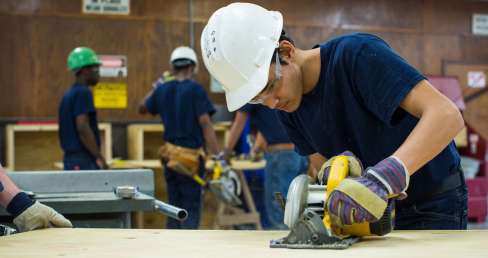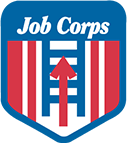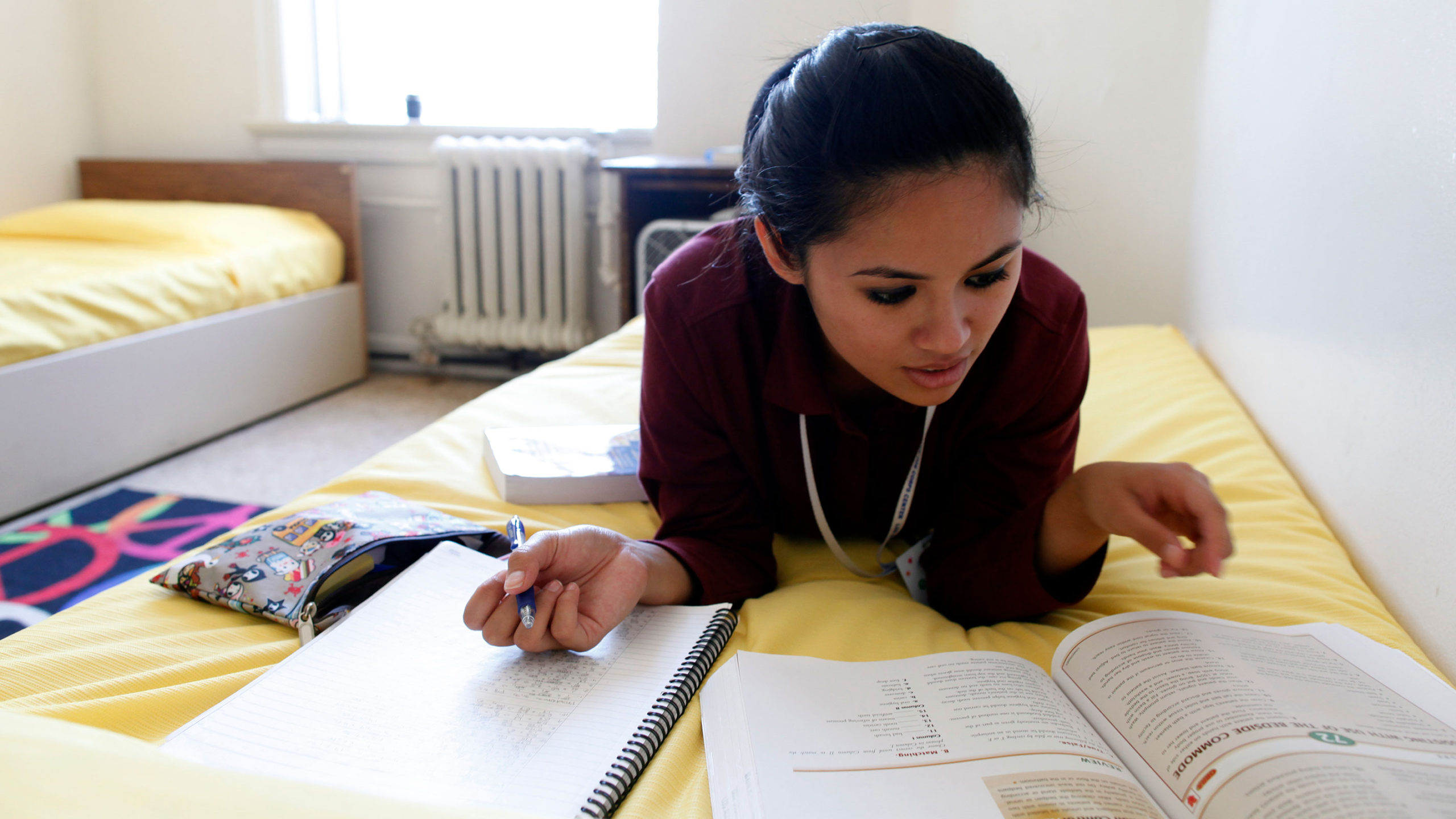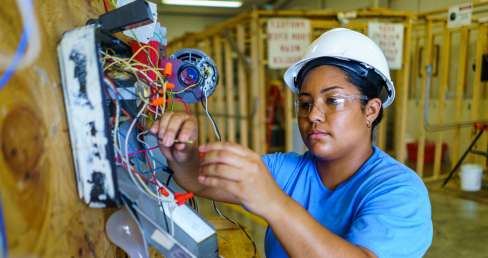SKILLS
Students in Carpentry are trained in the following subject areas:
- Constructing, installing, and repairing structures and fixtures using wood, metal, drywall, and other materials
- Measuring materials and distances for project layout
- Properly using hand and power tools to cut and fasten materials according to specified measurements
- Building structures out of wood and metal, erecting scaffolds, and building concrete forms according to sketches, blueprints, or oral instructions
- Following established safety rules and regulations and maintaining a safe and clean environment
CAREER OPTIONS
Most Carpentry Job Corps graduates go on to work as carpenters in the public or private sector.
REQUIREMENTS
Before entering the program, students must:
- Complete the core curriculum with passing scores on all written and performance tests.
- Meet basic academic requirements in math and reading.
- Have a high school diploma or equivalent.
CREDENTIALS
As a Job Corps student, you will have the opportunity to earn credentials in your training area that may lead to greater employment opportunities, higher wages, and promotions.
Students who complete a center-based program in the Construction training area can earn nationally recognized credentials from organizations such as:
- National Center for Construction Education and Research (NCCER)
Students training in union-affiliated programs can earn a certificate of completion that offers apprenticeship opportunities and on-the-job experience from organizations such as:
- United Brotherhood of Carpenters (UBC)
- International Masonry Institute (IMI)
- International Union of Operating Engineers (IUOE)
- The International Union of Painters and Allied Trades (IUPAT)
- National Plastering Industry Joint Apprenticeship Trust Fund (NPIJATF)
WHO WE ARE & WHAT WE DO
FROM 1964 TO TODAY, JOB CORPS
HELPS YOUNG PEOPLE SUCCEED
NATIONAL MISSION
Job Corps is a no-cost education and career technical training program administered by the U.S. Department of Labor that helps young people ages 16 to 24 improve the quality of their lives through career technical and academic training. The Job Corps program is authorized by Title I-C of the Workforce Innovation and Opportunity Act of 2014 (supersedes WIA 1998). For more information about the Job Corps program at a national level, please visit our Official Public Web Site.
OUR CENTER'S MISSION
At Carl D. Perkins Job Corps Center, we support the Job Corps program’s mission to teach eligible young people the skills they need to become employable and independent and place them in meaningful jobs or further education.
A DAY IN THE LIFE AT JOB CORPS
A typical day at Carl D. Perkins Job Corps Center is full of activities to help our students prepare for the real world. Students get up early and spend the majority of their day receiving academic and hands-on career technical training.
After dinner, students may do chores in their dorms, study, attend high school classes or tutoring, take advantage of professional development opportunities, participate in enrichment and recreational activities, or participate in clubs and team sports. Most students are in bed by 10 p.m. to rest for the next day’s tasks.
HOUSING: A FURNISHED DORM
Our campus' residential living facilities can house 160 male students and 80 female students in two dorms. Each room has a private bathroom. Residential students live with up to three roommates and enjoy the following amenities:
TV lounges
computer labs
wi-fi
no-cost laundry facilities
irons & ironing boards
microwaves
vending machines
private bathrooms
Residential advisers are on-site to help make dorm life safe, clean, and productive for students. We also serve nonresidential students.
BOOKS AND SUPPLIES
Job Corps provides, at no cost to you, any materials and supplies (i.e., books, workbooks, testing materials, specialized and safety equipment) you'll need to complete your academic and career training programs.
CHILDCARE ALLOTMENT
For students with dependent children, you may authorize $5, $10, or $15 to be deducted from your living allowance for childcare. Whichever amount you choose, Job Corps' contribution matches five times your contribution. For example, when you contribute $5, the center contributes $25 for a total allotment of $30. A check for the total allotment will be sent to your child's caregiver.
CLOTHING: FOR CAREER TRAINING
Centers issue, at no cost to you, the uniforms, specialized and safety equipment, and clothing necessary to participate in your career training program. After you have been in Job Corps for 30 to 90 days, you will be eligible to receive a clothing allowance of $100 to purchase additional personal clothing items. After that, students within 90 days of graduation from Job Corps can receive an additional $125, and students who enroll in Advanced Training are eligible for an additional $100.
FOOD: NUTRITIOUS MEALS
Nutritious and well-balanced meals are prepared daily in the center's cafeteria at no cost to you. Breakfast, lunch, dinner, and an evening snack are served Monday through Friday. Brunch and dinner are served on weekends and holidays.
HEALTH & WELLNESS: BASIC MEDICAL CARE
Our wellness center provides basic medical, dental, optometry, and mental health services which are provided free to you.
MONEY: A LIVING ALLOWANCE
Job Corps pays you a living allowance in cash twice a month. New and readmitted students receive arrival pay in the amount of a $25.
After that, the amount of your base pay depends on the number of days you are eligible for payment. For days 1-182, you receive $25 every two weeks. After 183 days, pay is increased to $35.
Just like a real job, taxes are deducted, and you'll receive a W-2 at the end of each year.
TRANSPORTATION
Students who live off campus are provided free transportation to and from our center.



